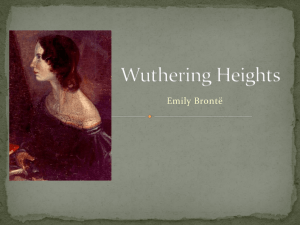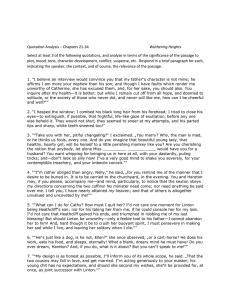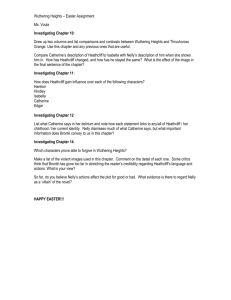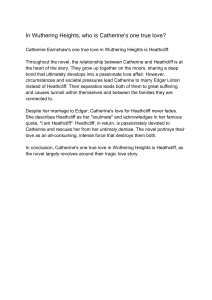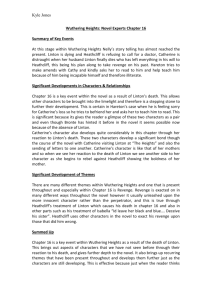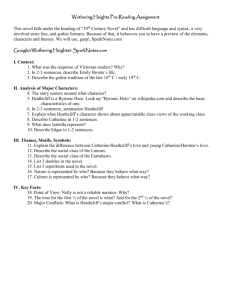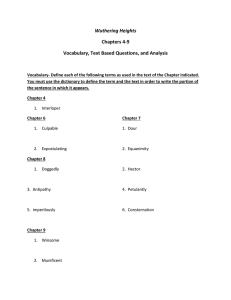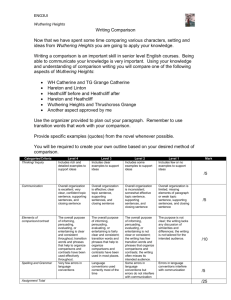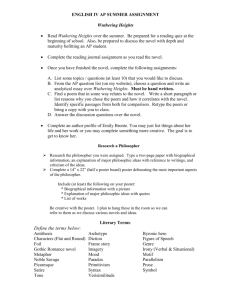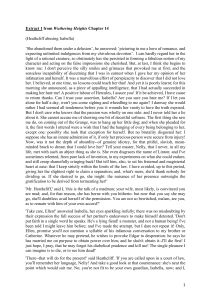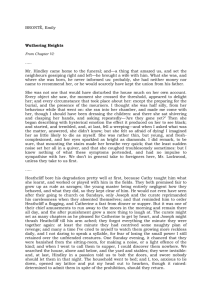Gothicquotes
advertisement
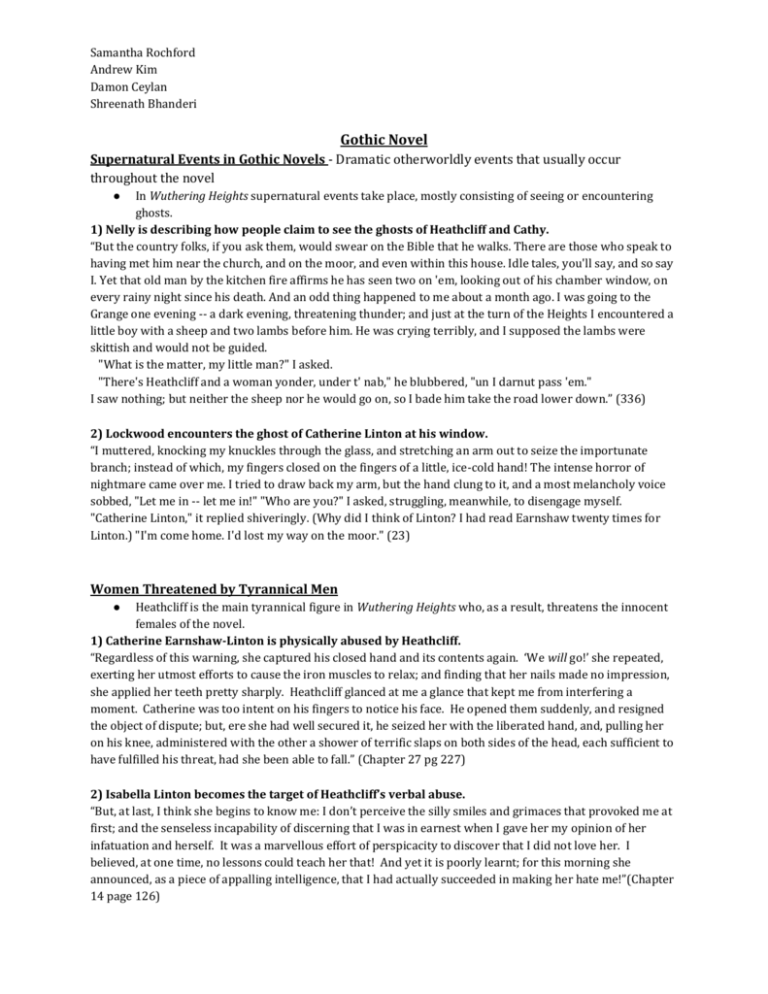
Samantha Rochford Andrew Kim Damon Ceylan Shreenath Bhanderi Gothic Novel Supernatural Events in Gothic Novels - Dramatic otherworldly events that usually occur throughout the novel In Wuthering Heights supernatural events take place, mostly consisting of seeing or encountering ghosts. 1) Nelly is describing how people claim to see the ghosts of Heathcliff and Cathy. “But the country folks, if you ask them, would swear on the Bible that he walks. There are those who speak to having met him near the church, and on the moor, and even within this house. Idle tales, you'll say, and so say I. Yet that old man by the kitchen fire affirms he has seen two on 'em, looking out of his chamber window, on every rainy night since his death. And an odd thing happened to me about a month ago. I was going to the Grange one evening -- a dark evening, threatening thunder; and just at the turn of the Heights I encountered a little boy with a sheep and two lambs before him. He was crying terribly, and I supposed the lambs were skittish and would not be guided. "What is the matter, my little man?" I asked. "There's Heathcliff and a woman yonder, under t' nab," he blubbered, "un I darnut pass 'em." I saw nothing; but neither the sheep nor he would go on, so I bade him take the road lower down.” (336) ● 2) Lockwood encounters the ghost of Catherine Linton at his window. “I muttered, knocking my knuckles through the glass, and stretching an arm out to seize the importunate branch; instead of which, my fingers closed on the fingers of a little, ice-cold hand! The intense horror of nightmare came over me. I tried to draw back my arm, but the hand clung to it, and a most melancholy voice sobbed, "Let me in -- let me in!" "Who are you?" I asked, struggling, meanwhile, to disengage myself. "Catherine Linton," it replied shiveringly. (Why did I think of Linton? I had read Earnshaw twenty times for Linton.) "I'm come home. I'd lost my way on the moor." (23) Women Threatened by Tyrannical Men Heathcliff is the main tyrannical figure in Wuthering Heights who, as a result, threatens the innocent females of the novel. 1) Catherine Earnshaw-Linton is physically abused by Heathcliff. “Regardless of this warning, she captured his closed hand and its contents again. ‘We will go!’ she repeated, exerting her utmost efforts to cause the iron muscles to relax; and finding that her nails made no impression, she applied her teeth pretty sharply. Heathcliff glanced at me a glance that kept me from interfering a moment. Catherine was too intent on his fingers to notice his face. He opened them suddenly, and resigned the object of dispute; but, ere she had well secured it, he seized her with the liberated hand, and, pulling her on his knee, administered with the other a shower of terrific slaps on both sides of the head, each sufficient to have fulfilled his threat, had she been able to fall.” (Chapter 27 pg 227) ● 2) Isabella Linton becomes the target of Heathcliff’s verbal abuse. “But, at last, I think she begins to know me: I don’t perceive the silly smiles and grimaces that provoked me at first; and the senseless incapability of discerning that I was in earnest when I gave her my opinion of her infatuation and herself. It was a marvellous effort of perspicacity to discover that I did not love her. I believed, at one time, no lessons could teach her that! And yet it is poorly learnt; for this morning she announced, as a piece of appalling intelligence, that I had actually succeeded in making her hate me!”(Chapter 14 page 126) Gothic Diction - sets the atmosphere and maintains the dark and stimulated feel through vocabulary describing mystery, fear, terror, sorrow, surprise, hast, anger, largeness, and darkness ● In Wuthering Heights, the dark diction that is used reflects Gothic elements. 1)“A sorrowful sight I saw: dark night coming down prematurely, and sky and hills mingled in one bitter whirl of wind and suffocating snow.” (12) 2)“There was no moon, and everything beneath lay in misty darkness: not a light gleamed from any house, far or near all had been extinguished long ago: and those at Wuthering Heights were never visible—still she asserted she caught their shining.” (126) Setting in a Castle (or house in film) - Usually takes place near something dark, abandoned, and mysterious like a castle In Great Expectations the gothic element of a setting in a dark, abandoned castle like place is exemplified as Pip enters Miss Havisham’s house for the first time. 1) Pip enters the grounds of Miss Havisham’s house and notices a vacant, old brewery. “My young conductress locked the gate, and we went across the court-yard. It was paved and clean, but grass was growing in every crevice. The brewery buildings had a little lane of communication with it, and the wooden gates of that lane stood open, and all the brewery beyond, stood open, away to the high enclosing wall; and all was empty and disused. The cold wind seemed to blow colder there, than outside the gate; and it made a shrill noise in howling in and out at the open sides of the brewery, like the noise of wind in the rigging of a ship at sea.”(Chapter 8 pg. 54) ● 2) Pip enters the actual house and sees that all the passages are very dark. “We went into the house by a side door - the great front entrance had two chains across it outside - and the first thing I noticed was, that the passages were all dark, and that she had left a candle burning there. She took it up, and we went through more passages and up a staircase, and still it was all dark, and only the candle lighted us.” (Chapter 8 pg. 55)
